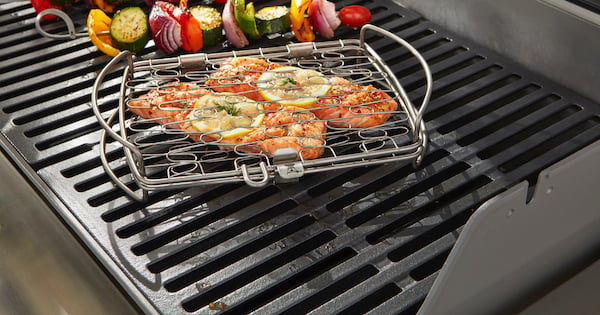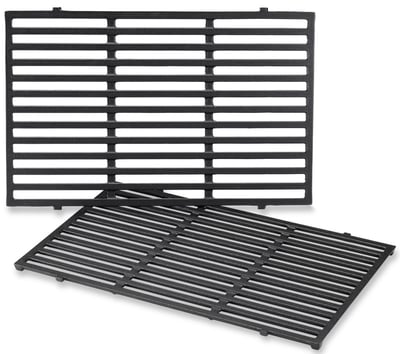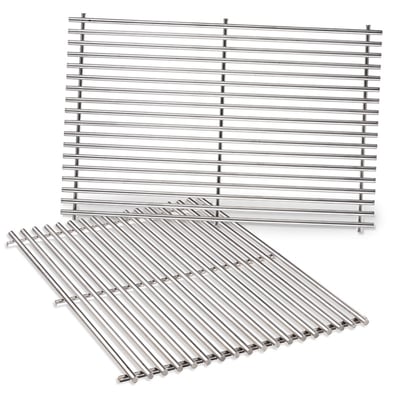
When you are looking for your next Weber grill, there are lots of features and options to consider with the different Weber models available. One of the most visually obvious choices is whether you want stainless steel cooking or cast iron grill grates on your main grilling surface. There are pros and cons for both options and it might come down to a matter of personal preference.
Weber is an industry leader in gas grills and they offer a complete lineup of grills to meet every budget. Grill grates are just one of many choices you'll make when selecting your next Weber grill. To learn more about Weber's model lineup and all the features they offer, read our full article: Weber Gas Grills - Everything You Need To Know.
In this article, we'll give you a complete review of the Weber grill grates from using them to caring for them to replacing them. Let's dig in!
Weber Cast Iron Grates
Weber's basic Spirit Series grills and some of their Genesis Series models come with porcelain enameled cast iron grill grates. Just because the cast iron grates come on the less expensive models doesn't mean stainless steel grates are more desirable for everyone. Here are some of the pros and cons of cast iron grill grates to keep in mind.
Pros:
-
They stay hot longer. Cast iron grill grates take longer to heat up than their stainless steel counterparts, but once they are up to temperature, they stay hot longer.
-
Grill marks for that authentic look. Cast iron grill grates are better at giving that grilled finish. Weber has designed their cast iron grill grates to be reversible. One side has a narrower tented edge, while the other side has a wide flat edge ideal for making tracks on your juiciest steaks and burgers.
-
Less expensive to replace. In the event that your cast iron grates wear out and need replacement and you are beyond Weber's generous warranty, they are less expensive to replace than stainless steel grates.
Cons:
-
They are heavy. Cast iron grates are heavier and can be more difficult to pick up and move around when cleaning and maintaining your grill.
-
More difficult to clean. When considering Weber stainless steel grill grates vs cast iron - consider cleaning time. Cast iron grates are more difficult to keep clean and take longer to clean after each use than stainless steel grates.

Weber Stainless Steel Grates
In considering Weber stainless steel grill grates vs cast iron, we now turn our attention to stainless steel. You'll find these standard on many of Weber's Genesis Series models and all of their top-of-the-line Summit Series grill models. As of 2019, their Special Edition Genesis II models come with heavy-duty 9mm stainless steel grates. Let's take a closer look at the pros and cons.
Pros:
-
They're durable. Stainless steel grill grates are very durable and will last for many years. They are less likely to rust and corrode than cast iron grates.
-
Easy to clean. Due to the nature of stainless steel, food and caked on oils are less likely to stick to the grates so you'll need to do less brushing and scraping after each use.
-
They heat up quickly. Stainless steel grates heat up more quickly than cast iron grates. If you grill nightly and are pressed for time, this could be a meaningful influence on your choice.
- Lightweight. Stainless steel grill grates are light and easy to maneuver when cleaning your grill.
Cons:
-
More expensive to replace. In the event that your stainless steel grates wear out and need replacement and you are beyond Weber's generous warranty, they are more expensive to replace than cast iron grates.
-
No authentic grill marks. Some grill masters love their grill marks and just don't like stainless steel grates because they don't give that old fashioned authentic searing experience when grilling and they don't leave those awesome grill marks.
-
They don't retain heat as long. While stainless steel grates heat up faster than cast iron, they also cool down more quickly.

Which Are Better For You?
We hope you enjoyed our reviews and comparison of Weber stainless steel grill grates vs cast iron. Deciding which is better for you comes down to weighing out the pros and cons and knowing what is important to you. If you are looking for durability, ease of use and cleaning and want to cut down on your grilling and cleaning time, stainless steel may be the right choice.
If you are budget-conscious or are nostalgic and like old-fashioned grilling with sear marks, etc, then cast iron grates may be the way to go.
If your grill comes with cast iron grates, you can also upgrade to stainless steel when you replace your grates if you are so inclined. One of the great things about Weber is that they don't make replacement parts impossible to find!
Additional Resources
We hope you enjoyed our review of the Weber grill grates. To learn more about Weber, read our full article - Weber Gas Grills - Everything You Need to Know!
If you want to learn more about the process of comparing gas grills from different manufacturers and all the different styles, types and features of grills across the industry, download our Free Grilling Buyer's Guide below.
Editor's Note: This blog was originally written in August of 2018 and has been completely revamped and updated for accuracy as of the publication date noted above.




